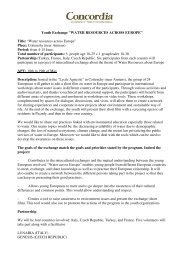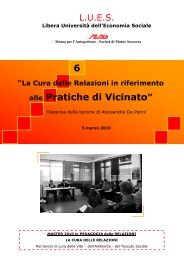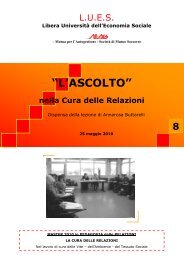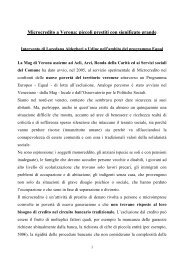La cura delle relazioni con riferimento al pensiero di Edith Stein - Mag
La cura delle relazioni con riferimento al pensiero di Edith Stein - Mag
La cura delle relazioni con riferimento al pensiero di Edith Stein - Mag
You also want an ePaper? Increase the reach of your titles
YUMPU automatically turns print PDFs into web optimized ePapers that Google loves.
intende E<strong>di</strong>th <strong>Stein</strong> - è qu<strong>al</strong>che cosa <strong>di</strong> duraturo e <strong>di</strong> interiore che orienta gli<br />
atti.<br />
Questo per introdurre il fatto che, per avere <strong>cura</strong> <strong>delle</strong> <strong>relazioni</strong>, non occorre solo un<br />
sapere esteriore - che semmai viene in se<strong>con</strong>da battuta. Occorre invece il dato<br />
fondante che è la s<strong>al</strong>dezza interiore (qu<strong>al</strong>cosa che resta), che ha la capacità <strong>di</strong><br />
orientare gli atti. Nel nostro caso, gli atti orientati ad aver <strong>cura</strong> <strong>delle</strong> <strong>relazioni</strong>.<br />
Che <strong>di</strong>fferenza c’è tra Ethos, cioè duratura <strong>di</strong>sposizione interiore, e legge esteriore o<br />
sapere esteriore e legge mor<strong>al</strong>e? <strong>La</strong> <strong>di</strong>fferenza è che la legge mor<strong>al</strong>e o mor<strong>al</strong>e<br />
pubblica (<strong>con</strong>testo storico) - o mor<strong>al</strong>e religiosa (<strong>con</strong>testo religioso) se parliamo <strong>di</strong><br />
<strong>con</strong>testi religiosi - ovvero le costruzioni che fanno <strong>riferimento</strong> a sistemi soci<strong>al</strong>i,<br />
cultur<strong>al</strong>i o religiosi, per la loro esteriorità, non è proprio s<strong>con</strong>tato che portino a un<br />
risultato duraturo. Proprio per la loro natura. Proprio per il fatto che sono soggetti ad<br />
incidenti storici, per chiamare così i cambiamenti che necessariamente o meno<br />
avvengono nei percorsi storici, che coinvolgono sia la storia propriamente detta, che la<br />
società, che gli <strong>al</strong>tri sistemi. Questa soggezione della legge mor<strong>al</strong>e (qu<strong>al</strong>siasi essa sia)<br />
e anche gli stessi saperi <strong>di</strong>sciplinari (es. sociologici, me<strong>di</strong>ci, filosofici), per la loro<br />
stessa natura, quando si costituis<strong>con</strong>o in sistema subis<strong>con</strong>o la stessa sorte. Ambis<strong>con</strong>o<br />
a <strong>di</strong>ventare duraturi ma è <strong>di</strong>mostrato, ormai c’è questa <strong>con</strong>sapevolezza perfino<br />
tragica, che il duraturo se <strong>di</strong>venta soli<strong>di</strong>ficazione del sistema non è più cre<strong>di</strong>bile.<br />
Si è <strong>di</strong>mostrato che c’è sempre un capolinea cui arrivano tutte le sistematizzazioni che<br />
pretendono e ambis<strong>con</strong>o a <strong>di</strong>ventare eterne.<br />
<strong>La</strong> <strong>cura</strong> <strong>delle</strong> <strong>relazioni</strong> e <strong>delle</strong> <strong>relazioni</strong> umane, ma non solo quelle umane, anche<br />
tutto quello che umano non è (es. anim<strong>al</strong>i e paesaggio) non ha una deca<strong>di</strong>bilità<br />
storica, a meno che se ne perda la sapienza.<br />
A meno che il cadere <strong>delle</strong> cose, che arrivano <strong>al</strong> capolinea per la loro rigi<strong>di</strong>tà<br />
sistemica, possa travolgere quello che sapere non è e che è sapienza relazion<strong>al</strong>e.<br />
E’ bene <strong>di</strong>stinguere i piani. C’è la necessità <strong>di</strong> acquisire saperi, avere competenze<br />
operative rivolte a certe azioni. Ma occorre sapere, quando si parla <strong>di</strong> <strong>cura</strong> <strong>delle</strong><br />
<strong>relazioni</strong>, che il <strong>riferimento</strong> primo deve essere questa <strong>di</strong>mensione dell’Ethos<br />
interiore, cioè un orientamento duraturo interiore che non è soggetto a<br />
deca<strong>di</strong>menti.<br />
Infatti si può parlare <strong>di</strong> una forma dell’interiorità come ciò che noi siamo capaci <strong>di</strong><br />
fare, quando siamo in presenza <strong>di</strong> una relazione facendo appello <strong>al</strong>l’interiorità nostra<br />
che prende così una certa forma. Come se fosse un <strong>di</strong>segno interno che si compone. E<br />
questo <strong>di</strong>segno interno E<strong>di</strong>th <strong>Stein</strong> lo chiama uno stabile atteggiamento<br />
dell’anima, che è quello da guadagnare pazientemente quando siamo<br />
2











